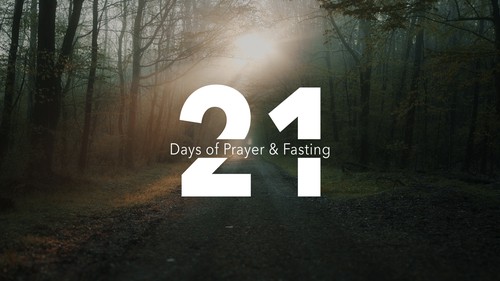Fasting and prayer are often linked together. Fasting is a way to demonstrate to God, and to ourselves, our seriousness about our relationship with Him - and the depth of our desire when praying for something.
WHAT IS FASTING?To “fast” is to voluntarily abstain from eating or drinking specific things for a significant length of time. Fasting is not intended to punish the flesh, but to redirect attention to God. Fasting can extend beyond mere food and drink to abstaining from any thing or any activity that is holding you back. What do you “consume” in terms of social food, intellectual food, spiritual food, and emotional food?
Are these things detracting from your relationship with God? Are you relying on things that have nothing to do with God to get you through your day?
If you have medical issues, in which limiting food or drink may cause problems, consider fasting from types of media or some other activity. What can you abstain from for three weeks so that you can see God more clearly? Don’t cheat yourself by missing out on the power of this season of fasting and prayer.
THE PURPOSE OF FASTINGYes, you may experience many benefits from fasting such as detoxing your body, breaking habits or addictions, losing weight, etc., but the goal of fasting is to experience God and but the goal of fasting is to experience God. Life may be all about you, what you want, and when you want it. Imagine if you separate yourself from your perceived needs (such as food)... so that you may see that life is all about Him.
FASTING PREPARATIONPrepare your heart:Open your heart and mind to hear what God says you need to change, and be willing to change it. Remember that fasting is not “earning” an answer to prayer. God cannot be bribed by human effort. God wants to answer our prayers and He answers out of grace. Fasting simply prepares us for God’s answer. What are the paths He wants you to walk? How much does He want you to pray and read His Word? Tell God you surrender your life to Him and that you want more of Him and His way.
Prepare your motives:Ephesians 1:3 says there are inexhaustible spiritual blessings assigned to us! Gifts such as wisdom, anointing, prayer power, healing power, teaching power, joy, or encouragement may be yours. When you eliminate things that keep you from focusing on God, He is able to help you experience things in new ways.
Prepare your body:If you decide to eat only fruits and vegetables for your fast, it may result in a cleansing of your physical body. You may feel sick as your body detoxes, but you’ll make it! This isn’t a mind game to see if you can survive eating less or not watching ESPN, but about experiencing God. People ask, “What does not eating have to do with my relationship with God?” Stop eating and find out!
Prepare your schedule:Decide where you will meet with God, what and when you will eat, and how you will spend your time differently. The fast is about communing with God, so don’t fill your time with dis- tractions that will keep you from feeling hungry. Create a plan and commit to spending more time with the Lord.
Fasting Guidelines:- Explain to your family in advance what you are doing
- Never complain or brag about your fast. Avoid talking about it.
- Establish an accountability partner for prayer & encouragement.
- Stay away from negative people.
- Spend as much time as possible alone in solitude and prayer. - Acknowledge that the flesh cannot be trained, it must be crucified.
- Journal your experience as you pray and meet with the Lord.
TYPES OF FASTSComplete Fast- Drinking only liquids, typically water and/or light juices. - Broth or soup may be included as options.
Selective Fast- Removing certain elements from your diet, such as, meat, sweets, or bread
- Drink water and juice, and eat a variety of fruits & vegetables.
Partial Fast- Abstaining from eating any food in the morning & afternoon. - Fast during specific times of the day like from sunup to sundown.
Soul Fast- This fast is common for those who do not have much experience fasting food, who have health issues that prevent them from fasting food, or who wish to refocus certain areas of their life that are out of balance. For instance, someone might select to abstain from using social media or watching television for the duration of the fast, and then choose to carefully bring that element back into their life in an orderly fashion at the conclusion of the fast.
Remember, your personal fast should present a level of challenge, but it is very important to know your body and your options.(Consult a doctor and follow what the Holy Spirit leads you to do.)
For more information about fasting and scripture references, download the
Pray First Guide.
